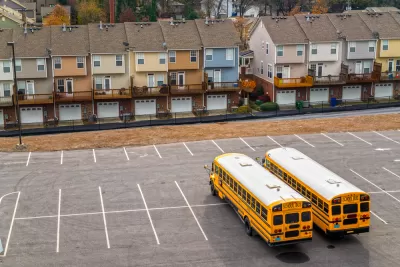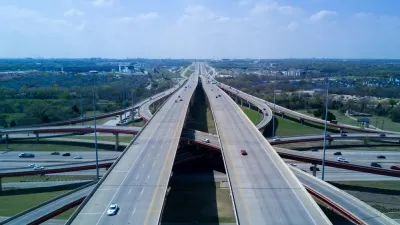Richard Florida cites new research to argue that car culture and car oriented communities are the main culprits in the unhealthy lifestyles of U.S. school children.

"Long commutes to school have negative impacts on children’s well-being, especially on sleep and exercise," writes Richard Florida, broadcasting news about a new study by researchers at Cal Poly, Rutgers University, and UCLA, published by the Journal of Planning Education and Research.
The study "takes a detailed look at how lengthy commutes affect the time kids devote to other daily activities," by analyzing "more than 2,700 high-school students’ responses from the American Time Use Survey (ATUS) conducted by the Bureau of Labor Statistics, spanning from 2003 to 2015."
There is good news to be found in the study's findings, according to Florida. The average commute was short (a8 minutes), and the most common commute was even shorter (five minutes and 10 minutes).
There is also bad news. There are a small number of students who commute more than an hour, which take a "substantial toll" on the exercise and sleep on those students. "Each additional minute of commuting is associated with an even greater 1.3-minute reduction in sleep," explains Florida. "To put that in perspective, if one student had a 10-minute commute, and a second had a 30- minute commute, the second student would get an average of 26 minutes less sleep."
Longer commutes take an even larger toll on exercise, as explained in the source article.
Florida's big point, however, is about how sprawling land use patterns force long commutes on many students, and given a shortage of realistic solutions to that problem in the near term, schools will have to take specific, effective action in shortening commute times for students.
FULL STORY: Long School Commutes Are Terrible for Kids

Alabama: Trump Terminates Settlements for Black Communities Harmed By Raw Sewage
Trump deemed the landmark civil rights agreement “illegal DEI and environmental justice policy.”

Study: Maui’s Plan to Convert Vacation Rentals to Long-Term Housing Could Cause Nearly $1 Billion Economic Loss
The plan would reduce visitor accommodation by 25% resulting in 1,900 jobs lost.

Planetizen Federal Action Tracker
A weekly monitor of how Trump’s orders and actions are impacting planners and planning in America.

Waymo Gets Permission to Map SF’s Market Street
If allowed to operate on the traffic-restricted street, Waymo’s autonomous taxis would have a leg up over ride-hailing competitors — and counter the city’s efforts to grow bike and pedestrian on the thoroughfare.

Parklet Symposium Highlights the Success of Shared Spaces
Parklets got a boost during the Covid-19 pandemic, when the concept was translated to outdoor dining programs that offered restaurants a lifeline during the shutdown.

Federal Homelessness Agency Places Entire Staff on Leave
The U.S. Interagency Council on Homelessness is the only federal agency dedicated to preventing and ending homelessness.
Urban Design for Planners 1: Software Tools
This six-course series explores essential urban design concepts using open source software and equips planners with the tools they need to participate fully in the urban design process.
Planning for Universal Design
Learn the tools for implementing Universal Design in planning regulations.
Caltrans
Smith Gee Studio
Institute for Housing and Urban Development Studies (IHS)
City of Grandview
Harvard GSD Executive Education
Toledo-Lucas County Plan Commissions
Salt Lake City
NYU Wagner Graduate School of Public Service





























